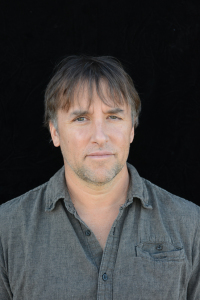As we leave behind a mostly forgettable (raccoons excluded) Summer and transition into (cue trumpets) prestige season, a number of awards contenders will attempt to salvage in quality what the 2014 box office has thus far lacked in quantity. If festival buzz and early reviews are to be trusted, The Imitation Game, Gone Girl, Foxcatcher and Birdman will be among the acclaimed films we’ll see going for the gold between now and year’s end. And I look forward to each and every one.
But we have already seen the most profound and important film of the year: Richard Linklater’s, Boyhood. By now the story of the film is well known. Shot over a nearly twelve-year period, Boyhood traces the fictional life of a boy through the ages of 6 to 18. For the first time, over the course of a singular fictional film, we see the actors aging naturally along with their characters. Since its debut earlier this year at Sundance, Boyhood has amassed one of the most ecstatic and unanimously positive critical responses of the 21st century. It’s been hailed the movie of the year, the decade, and the new millennium.
When Linklater came to town in July to do promotion, we had the opportunity to have him as a guest on Flick Nation Radio; the next evening, he and I did a series of Q & As following the SF premieres of the film. It was certainly an honor to support him and the film and share in the excitement, and as always he was a very forthcoming and thoughtful interview. Like his films, Linklater is a man without pretension, and our discussions of Boyhood, and his career, illuminate one of our very best directors at the pinnacle (so far) of his career.
Typically, he was modest regarding the high praise for Boyhood, even stating that he thought it would be a hard sell, “Because I thought you couldn’t describe the movie properly, but it was right there in front of me. The concept of the movie is a description of the movie. You can’t separate the content from the structure.”
He even downplayed the immense challenge of creating a film over such a long time span. “I felt the film gods were with us. All these magical things that happened along the way occurred to allow this film to exist. You can go through life thinking ‘what if what if what if’…but the odds were that we’d all be here twelve years later, and we are.”
I expressed my surprise that Boyhood offers none of the expected beats, the big moments one would expect in this kind of film—we’re aware that they’ve happened but we’re not seeing them. Was it a conscious choice to keep those big events off screen?
“Or are they that big a deal?” he explained. “The big beats, the first kiss? I had every year to weed through the obvious ideas, the bad ideas, things that didn’t really fit this movie. I was getting rid of things I felt were represented in other films, that have been done to death. I thought, ‘I have nothing so say about that, but I do have something to say about these other areas.’”
Most directors know every shot, dramatic beat, and line of dialogue before they start shooting – at least they should. But the sheer unpredictability of such a prolonged on-again, off-again production would certainly reveal potentially calamitous problems lurking up around the bend – was that something he grappled with?
No. In fact, for him that was the cool part. “Think of all the special things that were going to happen if you look at time and the unknown as your collaborator, in a positive way. How interesting it will be to see these kids grow up, to collaborate with their future selves. You had to make your relation with time in a certain way in that it was something positive and something exciting to look forward to.”
Linklater has always been a very confident filmmaker; with Boyhood he has achieved a cinematic transcendence, vividly manipulating time and inducing memory through sheer suggestion, evocative symbolism, and narrative intuition. This is the realm of deep jazz, high art, and creative genius. Consider Pet Sounds and Sgt. Pepper, two pop music masterpieces also concerned with the passage of time—both projects began as ruminations on childhood. And let’s not forget that Pulp Fiction, perhaps the most influential film of the last twenty years, was also a meta-statement on freeing cinematic narrative and the potential of film to alter time.
And there is an even more apt analogy: I believe Richard Linklater’s Boyhood is the cinematic equivalent of Marcel Proust’s In Search of Lost Time, (the seven-volume literary masterwork also known as Remembrance of Things Past). A critique published by Harper in 1949 summarizes this seminal work, which, along with James’ Joyce’s Ulysses, became the definitive statement of Psychological Realism in 20th century literature: “Unfolding without plot or crisis…Remembrance is great art distilled from memory itself; the structure determined entirely by moods and sensations evoked by the illusion of time passing, or seeming to pass, recurring, or seeming to recur.”
This could have been extracted from nearly any review of Boyhood. Now, I am not suggesting that Linklater’s refreshingly realistic dialog is stylistically akin to Proust’s filigreed prose, simply that they both evolved the potential of their art by communicating this mystery, this ineffable aspect of our lives, our relationship to lost time. Linklater’s description of what he really wanted to explore with Boyhood? Proustian, indeed. “How the memory attaches to certain things and forgets others—it’s a mystery. The one relationship we have our entire lives is ourselves to our previous selves. We’re stuck with that. That makes up who we are, and how we process the world, and the narrative of our own lives. I think in this movie I was trying to replicate what it feels like to go through life, through time.”
Linklater’s commitment to collaborating with his own future self, and succeeding, is a model of creative filmmaking, heralding a new approach to narrative structure and redefining the concept of Life as Art through Cinema. What Linklater accomplished with Boyhood is in league with the great triumphs of the art world: creating a piece that is at once a bold leap forward conceptually and also the apotheosis of his previous films, bringing into focus and deepening an entire body of work.
If you take his Hollywood movies (School of Rock, Fast Food Nation, Bad News Bears) out of the mix and focus on his personal films, it is apparent that Linklater has been exploring the territory of time and memory throughout his career, from an impressive variety of angles and perspective: Slacker, Dazed and Confused, Waking Life, The Before Sunrise series, now all coalesce into a sustained study of our relationship to these mysteries. Boyhood both synthesizes and elevates his prior efforts, and solidifies his cinematic canon; one I suspect will remain as sturdy in that genre as In Search of Lost Time has proven in literature.
So, as we race towards awards season, other films will feel more powerful. They will tell more dramatic stories. They will have the big beats. The big actors. The big scores. They will be in your face, telling stories of love and war and death and outer space and criminal enterprise. They will entertain the hell out of you. But none will rattle your memory cage quite like Boyhood, and none will strike such a delicate, poetic balance between life and art while boldly going where no filmmaker has gone before. Boyhood is not about irony, surprise, or retribution. It is about truth. It simply rings true. The truth is the entertainment.
Linklater humbly concurred, “I think it couldn’t help but resonate with everybody’s life, because there is such a commonality. Yeah, it’s set in Texas, but it could be anywhere.”
Steve Wagner is a writer and co-host for Flick Nation Radio (www.flicknation.net). He was co-host and executive producer of the San Francisco (KGO/ABC Ch. 7) television program Filmtrip, and was the featured film critic on KFRC Classic Rock FM 99.7 and KKSF Talk AM 910 in San Francisco. Steve has contributed articles on film, music, and popular culture to numerous magazines and has interviewed over 300 actors, directors, screenwriters, and musicians. Steve is a regular contributor on The Talk Pod www.thetalkpod.com

Leave a Reply